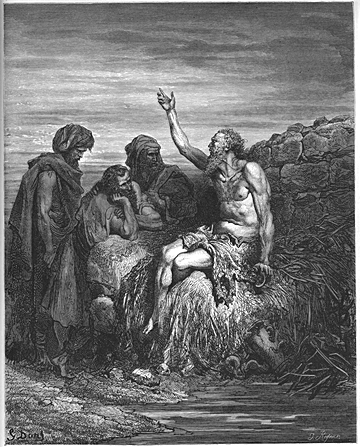Job 2
1 On another day, the angels came again and gathered together in front of Yahweh, and Satan came too.
Again, on the day when God’s sons came to present themselves before the LORD, Satan came also amongst them to present himself before the LORD.
2 Yahweh asked Satan, “Where have you come from?” Satan replied, “I have come from the earth, where I have been traveling back and forth, seeing what is happening.”
The LORD said to Satan, “Where have you come from?” Satan answered the LORD, and said, “From going back and forth in the earth, and from walking up and down in it.”
3 Yahweh asked Satan, “Have you (noticed/thought about) my [faithful] servant Job? He is very godly/righteous [DOU], he greatly respects/reveres me, and he [always] avoids doing evil things. And he still acts in a very godly/righteous manner, even though you persuaded me to [let you] cause disastrous things to happen to him for no reason.”
The LORD said to Satan, “Have you considered my servant Job? For there is no one like him in the earth, a blameless and an upright man, one who fears God, and turns away from evil. He still maintains his integrity, although you incited me against him, to ruin him without cause.”
4 Satan replied to Yahweh, “He praises you only because you bless him [IDM]. People will give up everything they have to save their own lives.
Satan answered the LORD, and said, “Skin for skin. Yes, all that a man has he will give for his life.
5 But if you harm his body [MTY], he will surely curse you openly [IDM]!”
But stretch out your hand now, and touch his bone and his flesh, and he will renounce you to your face.”
6 Yahweh replied to Satan, “(All right/Okay), you may do to him whatever you want to do, but do not cause him to die.”
The LORD said to Satan, “Behold, he is in your hand. Only spare his life.”
7 So Satan left, and he caused Job to be afflicted with very painful boils, from the top of his head to the soles of his feet.
So Satan went out from the presence of the LORD, and struck Job with painful sores from the sole of his foot to his head.
8 Job took a piece of broken pottery and scraped the boils on his skin, and he sat in ashes [as people did when they were mourning for those who had died].
He took for himself a potsherd to scrape himself with, and he sat amongst the ashes.
9 His wife said to him, “Are you still trying to (be loyal to/faithfully trust in) God? You should curse God, and then you will die.”
Then his wife said to him, “Do you still maintain your integrity? Renounce God, and die.”
10 But Job replied, “You talk like people who do not know God talk. (Should we accept only the good things that God [does for us]?/We should not accept only the good things that God [does for us].) [RHQ] We should also accept bad things.” So in spite of all these [things that happened to] Job, [he] did not say anything against God.
But he said to her, “You speak as one of the foolish women would speak. What? Shall we receive good at the hand of God, and shall we not receive evil?” In all this Job didn’t sin with his lips.
11 Among Job’s friends were Eliphaz from Teman [town], Bildad from Shuah [land] and Zophar from Naamah [land]. When they heard about all the terrible things that had happened to Job, they left their home areas and went together to Job to console/comfort him [DOU].
Now when Job’s three friends heard of all this evil that had come on him, they each came from his own place: Eliphaz the Temanite, Bildad the Shuhite, and Zophar the Naamathite; and they made an appointment together to come to sympathise with him and to comfort him.
12 When they saw Job from a distance, they almost did not recognize him. They wailed loudly, they tore their robes, and they threw dust over their heads [to show how sorry they were because of what had happened to Job].
When they lifted up their eyes from a distance, and didn’t recognise him, they raised their voices, and wept; and they each tore his robe, and sprinkled dust on their heads towards the sky.
13 Then they sat on the ground with Job for seven days. None of them said anything to Job, because they saw that he was suffering greatly, [and they did not think that anything that they said would lessen his pain].
So they sat down with him on the ground seven days and seven nights, and no one spoke a word to him, for they saw that his grief was very great.





















